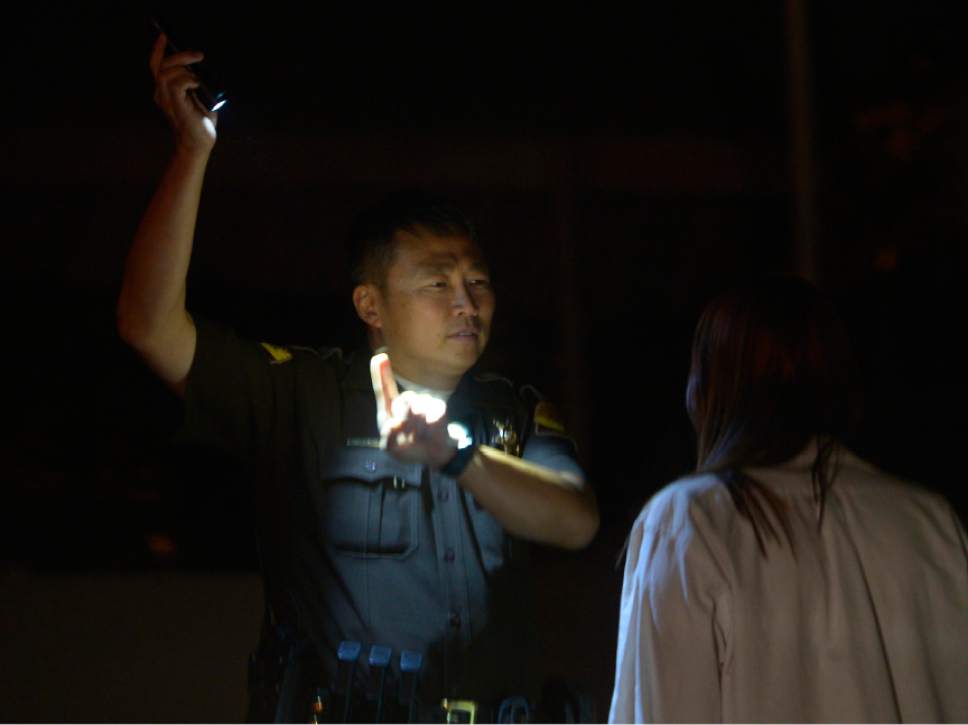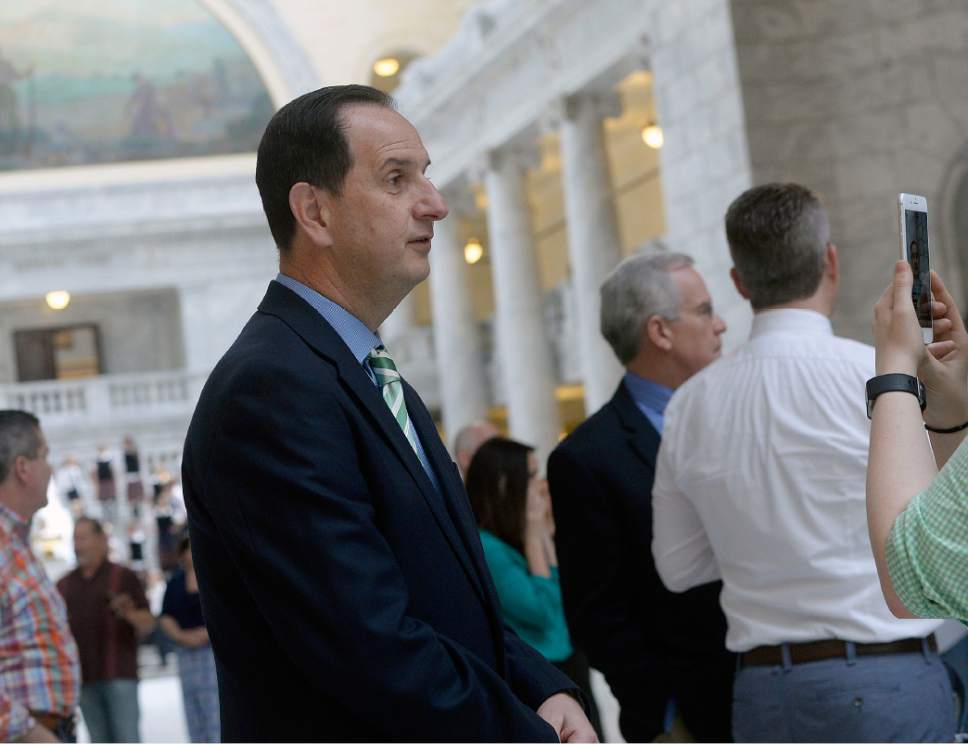This is an archived article that was published on sltrib.com in 2017, and information in the article may be outdated. It is provided only for personal research purposes and may not be reprinted.
Utahns are evenly split over the state's new toughest-in-the-nation drunken-driving law. But most support comes from nondrinking, "very active" Mormons, while other religious categories overwhelmingly oppose it — even "somewhat active" Mormons.
Those findings in a new Salt Lake Tribune/Hinckley Institute of Politics poll match a similar survey in March — despite high-profile advertising campaigns against it by the alcohol industry in recent months.
The new poll found that 50 percent of Utahns support the law, while 47 percent oppose it. When that law takes effect Dec. 30, 2018, it will drop the blood alcohol content to be considered legally drunk while driving from 0.08 percent to 0.05 percent.
The support margin in the earlier March poll, just before Gov. Gary Herbert signed HB155 into law, also was exactly 50 percent to 47 percent.
The only religious group that gives majority support for the new law is "very active" Mormons, who support it by a margin of 61-26 percent.
The margins among other groups include: "somewhat active" Mormons, 45-51 percent; "not active" Mormons, 25-76; Catholics, 9-91; Protestants, 7-78; and others, 28-73.
About 60 percent of Utahns are LDS, as are nearly 90 percent of state legislators.
The new poll also finds that by a 63-31 percent margin, Utahns say the law should be changed before it takes effect next year. Herbert called for tweaks in the law when he signed it, and the Legislature has been holding hearings that are ongoing.
Steve Clegg, who participated in the new survey conducted July 18-21 by Dan Jones & Associates, is an active member of The Church of Jesus Christ of Latter-day Saints, and supports the new law.
"I support anything that makes innocent people safer on the road, where they don't have to be endangered by those who are impaired," he said.
He added, "I don't know scientifically at what point someone is impaired" and whether that is at 0.05. But, he said, "it's got to be little bit better" than the current 0.08 percent.
Disagreeing is Mindy York of Cottonwood Heights, a nondenominational Christian who also participated in the poll.
At the 0.05 percent level, she said, some petite "adults could not even go out and have even one drink and drive home, even though they may not be impaired." She said she may be willing to change her mind if shown scientific proof that true impairment occurs at 0.05 percent.
York also worries the law will hurt tourism.
"I want tourists to feel like they can come here and we haven't made laws that are a little bit of a 'gotcha,' " she said. "I don't want people to be unnecessarily targeted."
Rep. Norm Thurston, R-Provo, who sponsored HB155, criticized the new poll because it questioned people about whether they support or oppose "the new state law that reduces the blood alcohol limit to 0.05 percent for drunk driving."
He said when people are asked about only numeric levels, "All they can do is react to what they have heard and to marketing. Very few people have ever tested themselves at 0.05, so they don't know what that feels like."
He added, "What we do know is the law will save lives. I suspect if you ask people if they support laws that will save lives, you will probably see a lot more people support those laws."
Thurston has argued that most countries in the world already use the 0.05 level, and the United States is among few that do not. The National Transportation Safety Board also has called for a 0.05 level — and traveled to Utah twice to testify for Thurston's bill to make Utah the first state to adopt it.
The governor also has pointed to the worldwide use of the 0.05 level as a sign that support of it is not limited to Utah Mormons.
"There's not very many Mormons in Rome, and they are doing it [the 0.05 limit] there also. I know there are people who are going to try to say this is a religious issue. That's just absolutely false. This is a public safety issue," Herbert said at a March news conference.
House Speaker Greg Hughes, who opposed the bill, said that after it passed, "People woke up and said, 'Did we really just do that,' " and joked that Thurston must have used "Jedi mind tricks" to pass it somewhat under the radar. But he said lawmakers are paying attention now to tweaks that may be needed before it takes effect.
"I think good work is being done now," the Draper Republican said.
For example, one hearing pointed out that the new law is written in a way that would ban new drivers from other countries from driving legally with even a drop of alcohol in their bloodstream — and lawmakers are looking at changing that.
Lawmakers also found that definitions in the law could inadvertently make it illegal for hunters to carry weapons while they exceed the 0.05 limit.
The governor said he is open to a proposal by some to allow three or four other states to enact a similar law first, and then follow, to lessen the likelihood of hurting tourism by being the first state to enforce the new limit.
Herbert said he also is open to creating lesser penalties for those arrested with a BAC of between 0.05 percent and 0.08 percent than for those with higher levels.
Since the law passed, the American Beverage Institute has run periodic ads criticizing it. A controversial one earlier this month suggested that senior citizens — it pictured some, including Herbert and nearly a dozen state lawmakers — are "more impaired ANY TIME they drive" than drivers with a BAC of 0.05 percent.
That infuriated state lawmakers. However, the House Republican Caucus on Wednesday jokingly gave the older members pictured in the ad a fancy copy of it, and jokingly created the "old people's caucus" — and some jested they would probably forget when any of its meetings are.
The alcohol industry group has said one goal of the ads is to overturn the new law, although the poll shows no change in public opinion here. The group has also said the ads are meant to persuade other states not to follow Utah's lead.
The pollster interviewed 614 registered Utah voters and has a margin of error of plus or minus 3.95 percentage points.





